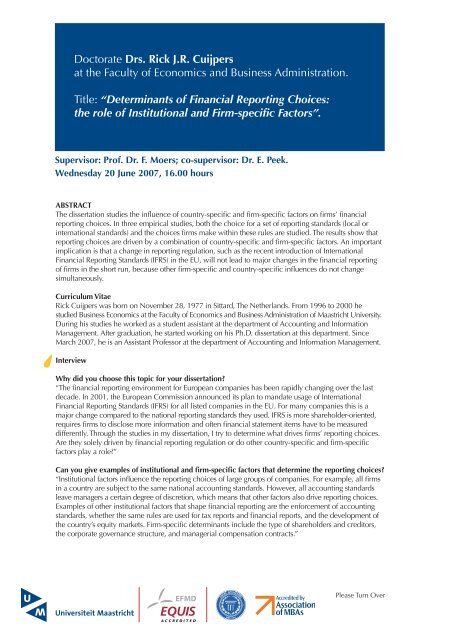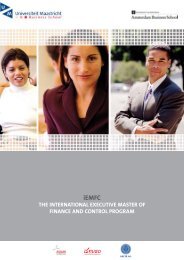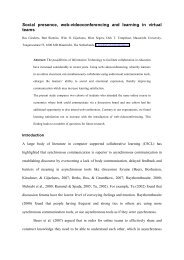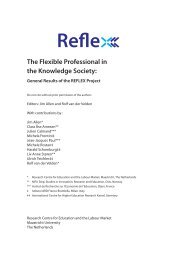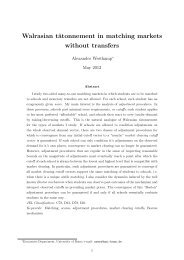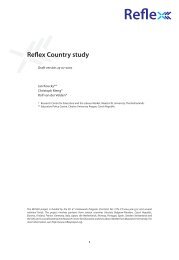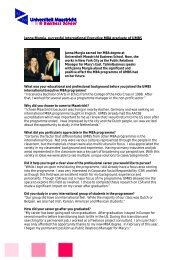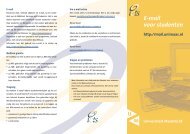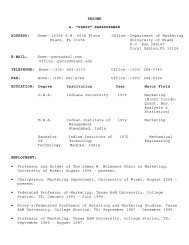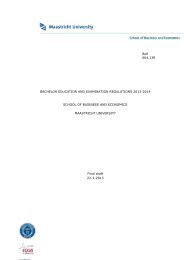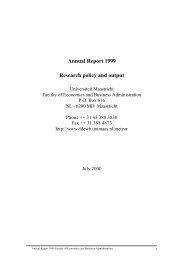promotie Cuijpers.indd - Maastricht University School of Business ...
promotie Cuijpers.indd - Maastricht University School of Business ...
promotie Cuijpers.indd - Maastricht University School of Business ...
Create successful ePaper yourself
Turn your PDF publications into a flip-book with our unique Google optimized e-Paper software.
Doctorate Drs. Rick J.R. <strong>Cuijpers</strong><br />
at the Faculty <strong>of</strong> Economics and <strong>Business</strong> Administration.<br />
Title: “Determinants <strong>of</strong> Financial Reporting Choices:<br />
the role <strong>of</strong> Institutional and Firm-specific Factors”.<br />
Supervisor: Pr<strong>of</strong>. Dr. F. Moers; co-supervisor: Dr. E. Peek.<br />
Wednesday 20 June 2007, 16.00 hours<br />
ABSTRACT<br />
The dissertation studies the influence <strong>of</strong> country-specific and firm-specific factors on firms’ financial<br />
reporting choices. In three empirical studies, both the choice for a set <strong>of</strong> reporting standards (local or<br />
international standards) and the choices firms make within these rules are studied. The results show that<br />
reporting choices are driven by a combination <strong>of</strong> country-specific and firm-specific factors. An important<br />
implication is that a change in reporting regulation, such as the recent introduction <strong>of</strong> International<br />
Financial Reporting Standards (IFRS) in the EU, will not lead to major changes in the financial reporting<br />
<strong>of</strong> firms in the short run, because other firm-specific and country-specific influences do not change<br />
simultaneously.<br />
Curriculum Vitae<br />
Rick <strong>Cuijpers</strong> was born on November 28, 1977 in Sittard, The Netherlands. From 1996 to 2000 he<br />
studied <strong>Business</strong> Economics at the Faculty <strong>of</strong> Economics and <strong>Business</strong> Administration <strong>of</strong> <strong>Maastricht</strong> <strong>University</strong>.<br />
During his studies he worked as a student assistant at the department <strong>of</strong> Accounting and Information<br />
Management. After graduation, he started working on his Ph.D. dissertation at this department. Since<br />
March 2007, he is an Assistant Pr<strong>of</strong>essor at the department <strong>of</strong> Accounting and Information Management.<br />
‘<br />
Interview<br />
Why did you choose this topic for your dissertation?<br />
“The financial reporting environment for European companies has been rapidly changing over the last<br />
decade. In 2001, the European Commission announced its plan to mandate usage <strong>of</strong> International<br />
Financial Reporting Standards (IFRS) for all listed companies in the EU. For many companies this is a<br />
major change compared to the national reporting standards they used. IFRS is more shareholder-oriented,<br />
requires firms to disclose more information and <strong>of</strong>ten financial statement items have to be measured<br />
differently. Through the studies in my dissertation, I try to determine what drives firms’ reporting choices.<br />
Are they solely driven by financial reporting regulation or do other country-specific and firm-specific<br />
factors play a role?”<br />
Can you give examples <strong>of</strong> institutional and firm-specific factors that determine the reporting choices?<br />
“Institutional factors influence the reporting choices <strong>of</strong> large groups <strong>of</strong> companies. For example, all firms<br />
in a country are subject to the same national accounting standards. However, all accounting standards<br />
leave managers a certain degree <strong>of</strong> discretion, which means that other factors also drive reporting choices.<br />
Examples <strong>of</strong> other institutional factors that shape financial reporting are the enforcement <strong>of</strong> accounting<br />
standards, whether the same rules are used for tax reports and financial reports, and the development <strong>of</strong><br />
the country’s equity markets. Firm-specific determinants include the type <strong>of</strong> shareholders and creditors,<br />
the corporate governance structure, and managerial compensation contracts.”<br />
EFMD<br />
Please Turn Over
Did you find that reporting choices are made on the basis <strong>of</strong> institutional factors in several European<br />
countries?<br />
“I find that managers make reporting choices based on a combination <strong>of</strong> institutional and firm-specific<br />
factors. The results in chapter 3 indicate that corporate governance has an impact on firms’ financial<br />
reporting. I show in chapter 4 that the influence <strong>of</strong> country-specific factors depends on a firm’s ownership<br />
structure. I find that firms with widely held share ownership differ less in their financial reporting internationally<br />
than firms with concentrated ownership. This indicates that the influence <strong>of</strong> institutional factors<br />
on reporting choices is less for firms with widespread share ownership than for firms with concentrated<br />
share ownership.”<br />
What will be the consequences when the implementation<br />
<strong>of</strong> IFRS in the EU has little impact for the time<br />
being?<br />
“The influence <strong>of</strong> the implementation <strong>of</strong> IFRS across the<br />
EU in 2005 may have a smaller effect than anticipated by<br />
the European Commission. This is because, besides the<br />
reporting standards, other institutional and firm-specific<br />
factors, which have not changed simultaneously, also<br />
have an effect on firms’ reporting choices. Therefore,<br />
during the initial years <strong>of</strong> IFRS usage, financial reporting<br />
<strong>of</strong> companies may not become more shareholder-oriented<br />
or more comparable across countries. However, more<br />
and more international differences are disappearing.<br />
Recently, new or revised European legislation has been<br />
adopted, harmonizing, among others, auditing and<br />
transparency requirements across countries. Also, the use<br />
<strong>of</strong> takeover defence mechanisms, an important firm-specific<br />
reporting determinant, has been limited. Therefore, my<br />
expectation is that over time financial reporting across<br />
the EU will become more comparable and more targeted<br />
at shareholders’ demands.”<br />
Who will benefit from the results <strong>of</strong> your dissertation?<br />
“Given the reporting discretion that managers have and in order to properly interpret the information in<br />
financial statements, users <strong>of</strong> these statements need to understand the factors that influence managers’<br />
reporting choices. Furthermore, it is important for regulators to know that companies will respond<br />
differently to institutional reforms, both within and across countries.”<br />
The Faculty <strong>of</strong> Economics and <strong>Business</strong> <strong>of</strong> Universiteit <strong>Maastricht</strong> <strong>of</strong>fers undergraduate (BSc) and graduate (MSc and MPhil)<br />
programmes as well as executive programmes and tailor-made education at UMBS.<br />
The study programmes are ranked as the best in The Netherlands in yearly reviews. The Faculty is internationally renowned for<br />
its Problem Based Learning method, its research, the international environment and the facilities.<br />
For more information about the Faculty <strong>of</strong> Economics and <strong>Business</strong> Administration, please contact:<br />
Student Recruitment and Communications Office<br />
Telephone Julienne Erckens at + 31 43 388 3860 or Leann Poeth at + 31 43 388 2056<br />
or e-mail j.erckens@efb.unimaas.nl or l.poeth@efb.unimaas.nl<br />
Interested in receiving the digital Newsletter <strong>of</strong> the FE&BA? Please register at www.talkinbusiness.nl<br />
‘<br />
Vormgeving en print, Océ <strong>Business</strong> Services UM | OBS 1566


